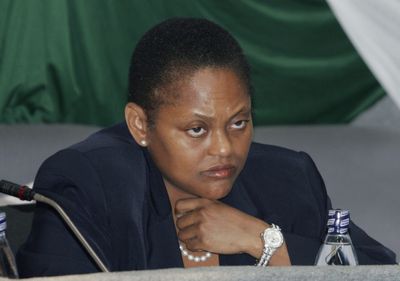31 killed in multiple blasts in Somalia
Coordination of attacks hints of al-Qaida

NAIROBI, Kenya – Five suicide blasts rocked government and international targets in northern Somalia on Wednesday, killing at least 31 people, according to international security officials, in the most highly coordinated terrorist strike in years in the troubled East African nation.
Although no group immediately claimed responsibility, the strike had the markings of an al-Qaida attack because of its timing and organization, Jendayi Frazer, the assistant secretary of state for African affairs, said in Nairobi, where regional leaders were holding meetings on Somalia’s long-running political crisis.
The midmorning blasts occurred within an hour in the semi-autonomous northern regions of Somaliland and Puntland, which are separated from the Arabian Peninsula by the Gulf of Aden.
Until now, the regions had been spared the high levels of violence that have engulfed the southern capital, Mogadishu, where an increasingly formidable Islamist insurgency has been raging for nearly two years. Security experts said the attacks appeared timed to disrupt the regional meeting in Nairobi aimed at jump-starting a peace process for Somalia, which hasn’t had a functioning government since 1991.
The insurgency is led by a militant group known as al-Shabaab, which the State Department has designated a terrorist organization and which has claimed ties with al-Qaida. The group has boycotted the peace talks, and its leaders have said they won’t respect a cease-fire that was signed over the weekend until all troops from neighboring Ethiopia, which invaded Somalia nearly two years ago with U.S. intelligence support to oust a hard-line Islamist regime, leave the country.
The worst damage Wednesday occurred in Hargeisa, the capital of Somaliland, where car bombs struck the presidential residence, a United Nations compound and the Ethiopian Embassy. Fourteen people were killed at the presidential compound, U.N. officials said, and a total of 16 at the U.N. compound and the embassy. A Hargeisa resident, Roda Isak, said that she saw blood all over the entrance to the palace, “like water.”
“There are a lot of injured people in the hospital,” Isak said by telephone. “Very serious injuries, blood everywhere, like you cannot recognize people’s faces.”
In Bossasso, the capital of neighboring Puntland, two cars loaded with explosives drove into separate compounds that house the Puntland intelligence service shortly after 10 a.m., according to Abdallah Rashid Abdalla, a teacher who also spoke by phone. Thirteen people were injured in the attacks, and one was killed, a woman who worked as a cook for the intelligence service, Abdalla said.
The attacks underscored the huge obstacles that the peace process faces.
A U.N.-backed transitional government was formed nearly five years ago to restore order to Somalia, but it has split apart because of corruption, infighting and clan divisions. With less than a year left in its mandate, its leaders have lost control of nearly all the country to militant groups such as al-Shabaab, which have begun targeting African Union peacekeepers and humanitarian workers.
The lawlessness extends to the waters off Somalia, where pirates in speedboats have earned world headlines this year by capturing dozens of vessels and securing millions of dollars in ransom payments.
Frazer rejected charges that U.S. policy in Somalia – which has included backing the Ethiopian invasion and launching several airstrikes on reported terrorist targets since last year, some of which reportedly have killed civilians – has contributed to the chaos. She noted that the Bush administration has provided $237 million in humanitarian aid this year and long has called for the Somali government to reach out to moderate Islamist leaders.
“The Somali leadership must come together to better govern their country, and to govern it in an inclusive fashion,” Frazer said. “That’s not a factor of U.S. policy.”
Frazer hailed the cease-fire between the Somali government and a leading opposition group composed of some moderate members of the former Islamist regime, which also calls for a 10,000-strong Somali police force to be established to provide security. Experts said that militants were unlikely to observe the agreement, however.
“The hard-core al-Shabaab are not on board,” said Richard Barno, a Somalia analyst with the Institute for Security Studies, a South Africa-based research center. “As long as hard-core al-Shabaab are not on board, they’re still going to cause problems. There’s still going to be violence.”